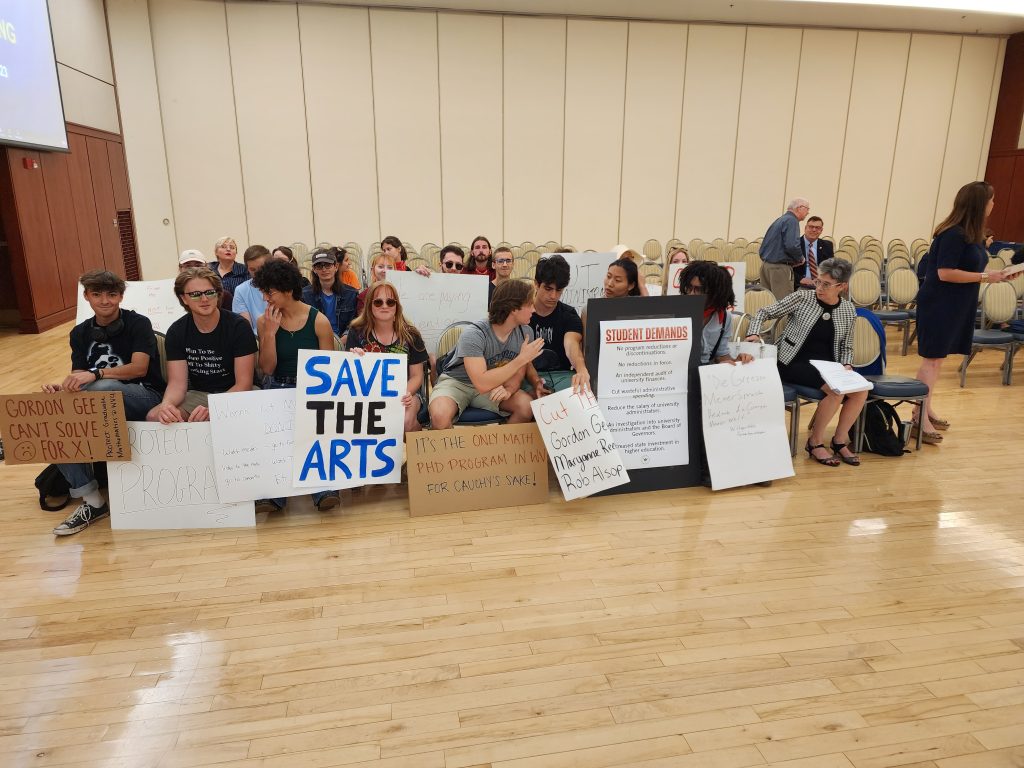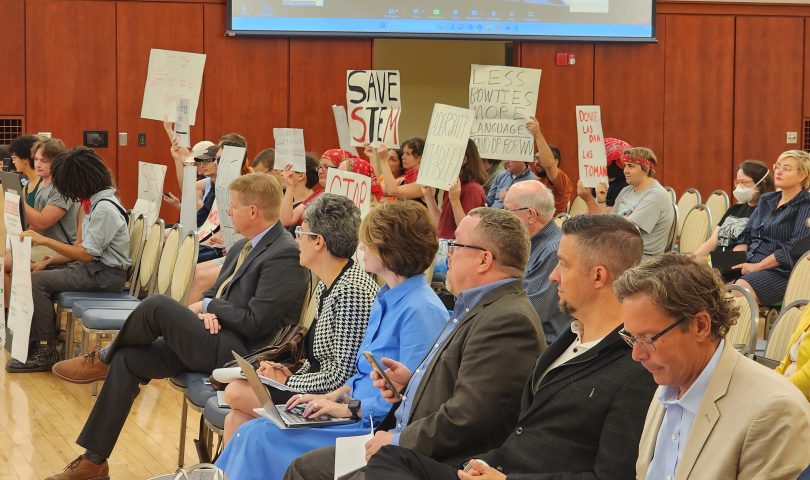MORGANTOWN – At a mostly informational Tuesday special meeting about WVU’s Academic Transformation, the Board of Governors learned that, so far, 19 of the 25 academic units called out for review have appealed proposed cuts.
Associate Provost Mark Gavin mentioned this during an update of progress on the Academic Program Portfolio Review and Realignment, and didn’t specify if the appeals concerned proposed faculty or program cuts.

The appeal period has begun and runs through Sept. 5. The provost’s office has proposed to discontinue 32 of 338 Morgantown campus majors and cut 169 faculty positions.
In a release sent out after the meeting, WVU also announced it “will restructure another large administrative unit as part of ongoing review and transformation efforts.”
According to the release, Cris DeBord, vice president of Talent and Culture, will retire later this year. That position will be subsquently be eliminated. The entire unit will be “reorganized to align and better serve the University community for the future,” the release states, though no specifics are given.
The BOG’s only action was to endorse a proposal presented by Provost Maryanne Reed to merge WVU Extension with the Davis College of Agriculture, Natural Resources and Design.
Reed said the merger would offer administrative efficiencies and cost savings. But more importantly, it will provide “enhanced instruction in both the classrooms and the communities we serve.”
Reed told the BOG that the review of WVU Extension and the reviews of Beckley and Keyser campuses will begin in January.
A small crowd of students and former students – most carrying signs protesting the proposed cuts – attended the meeting. Several hundred protested on the downtown and Evansdale campuses on Monday, with an organized walk-out, speeches and pleas to save jobs and programs.
The BOG opened the meeting by allowing some of the students present to offer comments. Most had signed up to do so, and because time remained in the allotted half hour, a few stood to speak impromptu.
Kolya Davidson talked about the proposed elimination of the World Languages, Literatures and Linguistics major. “I’m concerned about whether my degree will matter in the future,” he said. “How dare you attempt to limit the lives and the language of others?”
Meilin Statler said she’s a coal miner’s daughter who was taught the value of education. WVU’s brand is great, “but you are losing trust and value in higher education” through the proposed cuts.
Dylan Miller said he is a third-year chemical engineering student and was one of several who fears for the reputation of his degree and the university. He wanted to remind the BOG that in this process, “you are not just playing with numbers. … These are people’s education and lives that you are determining.”
BOG chair Taunja Willis-Miller thanked all those who spoke, saying, “None of this has been or will be entered into lightly.” They will hear more comments on Sept. 14, the day before they meet to vote on final recommendations for program reduction and discontinuation.
President Gordon Gee also expressed his appreciation for the comments. “We are doing very hard things and making very difficult decisions,” he said.
But transformation isn’t new, he said. He raised it in his first speech in 2014. And in 2016, “I then said that we needed to overhaul everything, including academics at that time. … This is what we’ve been working towards.”
So far, classified and non-classified staff have borne the brunt of the changes over the years, with more than 500 personnel lost, he said. “This is a process we’ve been undergoing for some time. … Any loss of an individual from our community is a loss for all of us.”
But less than 2% of the students will be affected, he said, and 93% of the faculty will remain.
Rob Alsop, WVU’s senior vice president for strategic initiatives, gave a presentation on academic and non-academic transformation. He noted that WVU isn’t alone in the troubles it’s facing – in West Virginia or nationally. From 2010-22, WVU’s FTE enrollment dropped 16.37%. But nine others saw declines too: Marshall lost 20.36%; Concord lost 44.2%; Fairmont State lost 30.61%. The School of Osteopathic Medicine saw the softest blow, losing only 2.36%.
Marshall has a $25 million deficit; Penn State reported a $140 million deficit; Rutgers, $125 million, he said. And WVU has been steadily cutting expenses since Fiscal Year 2017. His own department – Strategic Initiatives, is set for review and transformation.”
While the focus has been on the cuts, Alsop highlighted all the majors that will remain. “We are working to provide a tremendous amount of opportunities for our students.”
Email:dbeard@dominionpost.com





